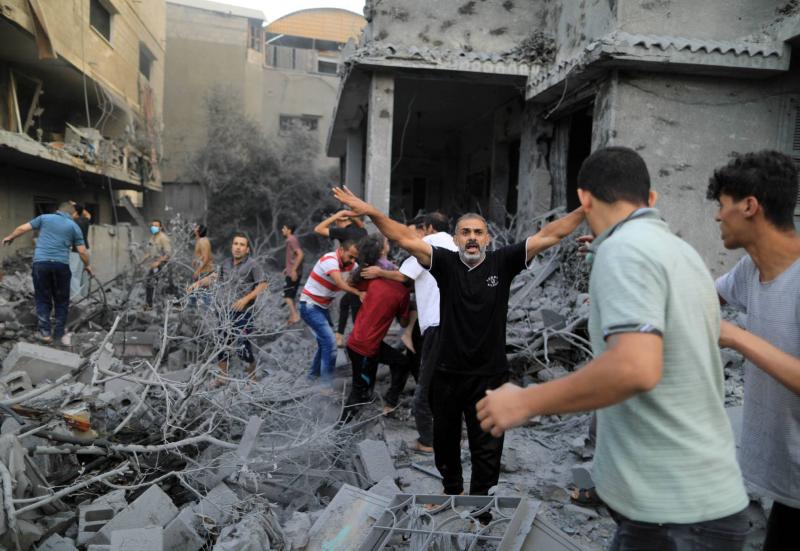The Lebanese group Hezbollah and the Israeli army have made statements indicating a desire to avoid escalating the ongoing war in the Gaza Strip after a drone strike killed Hamas deputy chief Saleh al-Arouri in Beirut. Hezbollah's Secretary-General Hassan Nasrallah said in a speech in Beirut on Wednesday that al-Arouri's killing was a "grave and serious crime that cannot be overlooked."
Nasrallah warned that his group would fight to the end if Israel chose to extend the war into Lebanon, but he did not issue specific threats against Israel in support of Hamas. Israel has neither confirmed nor denied the assassination of al-Arouri, but it has pledged to eradicate Hamas, which governs Gaza, following the attack launched by the group across the border on October 7, during which Israel claims 1,200 people were killed and around 240 others were kidnapped.
In response, Israel conducted intense ground and aerial assaults on Gaza, with the health ministry in the area stating that the registered number of Palestinians killed due to the Israeli strikes reached 22,313 as of Wednesday, approximately one percent of the total population of the 2.3 million residents in the Strip.
When asked by a reporter what Israel was doing in preparation for a potential response from Hezbollah, Israeli military spokesperson Admiral Daniel Hagari said, "I will not respond to what you just mentioned. We are focusing on fighting Hamas." John Kirby, the spokesperson for the White House, told reporters when asked about Nasrallah's speech, "We haven't seen Hezbollah rushing to support or assist Hamas." Another American official, speaking on the condition of anonymity, indicated that neither Hezbollah nor Israel seemed eager to enter into a war.
The official stated, "To our knowledge, there is no clear desire on Hezbollah's part to go to war with Israel, and vice versa." A senior U.S. official stated Wednesday that Secretary of State Antony Blinken would travel to the Middle East today, including a visit to Israel, as the U.S. continues diplomatic consultations regarding Israel's war on Gaza. The official, who spoke to reporters on the condition of anonymity, also mentioned that U.S. diplomatic envoy Amos Hochstein would travel to Israel to work on easing tensions between Israel and Hezbollah.
The assassination of al-Arouri, 57, marks another indication that the war, ongoing for nearly three months in Gaza, could extend beyond Gaza to clashes in the West Bank and exchanges of fire with Hezbollah on the Lebanese-Israeli border, as well as shipping routes in the Red Sea. Al-Arouri, who was living in Beirut, is the first high-ranking political leader of Hamas to be assassinated outside Palestinian territories since Israel launched a fierce attack from Gaza in response to Hamas's surprise assault on Israeli towns.
Hezbollah has engaged in near-daily mutual shelling with Israel across the southern border of Lebanon since the start of the Gaza war. Two security sources told Reuters that a local Hezbollah official and three other members were killed on Wednesday in an Israeli strike in southern Lebanon. More than 120 Hezbollah fighters and about 24 civilians have died in Lebanese territory, along with at least nine Israeli soldiers in Israel. Nasrallah stated, "If the enemy thinks of waging war on Lebanon, our fight will be without limits, without borders, without rules."
The killing of al-Arouri removes a major name from Israel's wanted list of Islamist adversaries and may push Hamas leaders abroad to hide more, complicating efforts towards negotiating a new ceasefire in Gaza and the release of more hostages. Israel has consistently accused al-Arouri of orchestrating attacks against Israelis, but a Hamas official stated that he was also at the "heart of negotiations" being conducted by Egypt and Qatar regarding the war in Gaza and the release of Israeli hostages held by Hamas.
Nasrallah's speech coincided with the fourth anniversary of the assassination of Quds Force commander Qassem Soleimani in a U.S. drone strike in Iraq. Around one hundred people were reported killed in two explosions on Wednesday during memorial services at the cemetery containing Soleimani's grave in southeastern Iran amidst growing tensions between Iran and Israel.
**Air and Ground Assaults**
Meanwhile, Israeli forces continued their ground and aerial attacks on the Gaza Strip, targeting the city of Khan Younis in the south and the Al-Bureij refugee camp in the center. The ongoing Israeli bombardment has resulted in the destruction of large areas of the densely populated Strip, leading to a humanitarian disaster. Most of the population has been displaced, crowding into shrinking areas, facing starvation due to food shortages. Israel claims it is trying to avoid harming civilians, but it holds Hamas responsible for placing fighters within residential areas, an assertion Hamas denies.
The Al-Qassam Brigades, the military wing of Hamas, announced the killing of ten Israeli soldiers in Al-Bureij and targeting five tanks and armored personnel carriers. The Israeli army stated that the number of soldiers killed since the start of its ground operation in the Strip on October 20 has reached 177.




